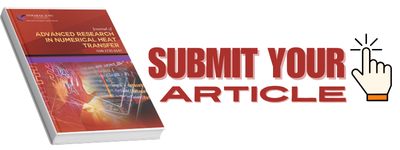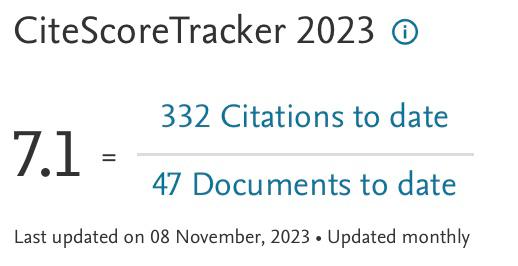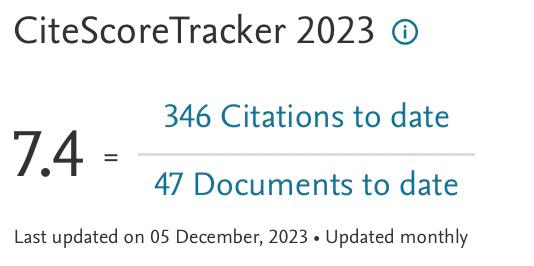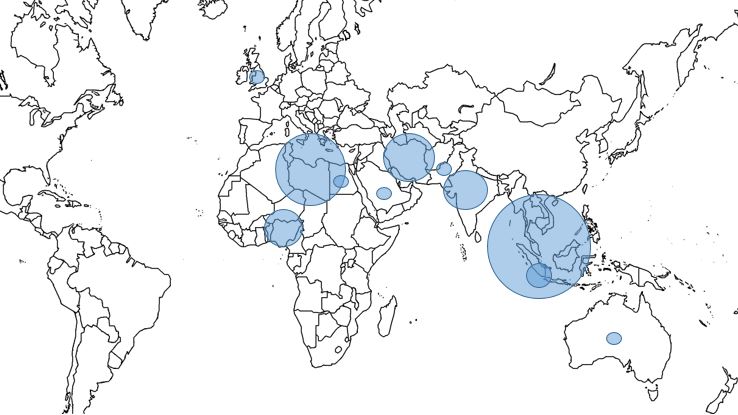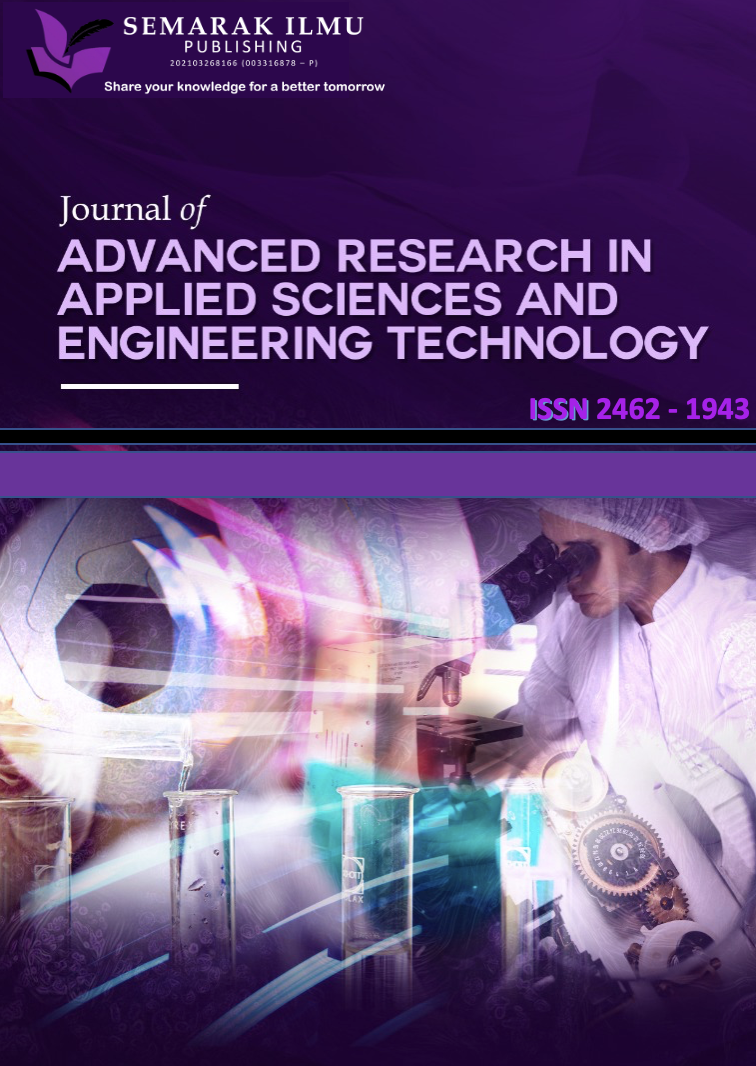Investigation of Al₂O₃:Cu Hybrid Nanofluid Composition in Jet Impingement Cooling: Numerical Analysis
DOI:
https://doi.org/10.37934/arnht.28.1.165175Keywords:
Hybrid nanofluid, Al₂O₃, Cu, Jet impingement, Heat transfer coefficient, Numerical analysisAbstract
Hybrid nanofluids have emerged as a promising medium for enhancing heat transfer in various cooling systems, particularly in jet impingement cooling applications. This study conducts a numerical analysis of the heat transfer performance of aluminium oxide (Al₂O₃) and copper (Cu) hybrid nanofluids at different mixing ratios (25:75, 50:50, and 75:25) under jet impingement cooling conditions. The research employs computational fluid dynamics (CFD) simulations to investigate the thermophysical properties and heat transfer behaviour of these hybrid nanofluids at a constant nanoparticle concentration of 0.5% by volume. Among the tested compositions, the 50:50 Al₂O₃ mixture demonstrated the highest heat transfer coefficient and surface temperature reduction, improving heat transfer by up to 22.20% compared to pure water. The findings suggest that the balanced thermal properties of this ratio has optimized cooling performance, making it suitable for industrial cooling applications, such as electronics and power systems, where efficient heat dissipation is critical.Downloads
References
Nordin, Nur Syahidah, Abdul Rahman Mohd Kasim, Iskandar Waini, Yusuf Olatunji Tijani, Sharidan Shafie, Najiyah Safwa Khashi’ie, and Nurul Amira Zainal. "Exploration of recent developments of hybrid nanofluids." Journal of Advanced Research in Fluid Mechanics and Thermal Sciences 114, no. 2 (2024): 130-154. https://doi.org/10.37934/arfmts.114.2.130154 DOI: https://doi.org/10.37934/arfmts.114.2.130154
Jelitaa, Marhama, and Habibis Salehb. "Improvement of Solar Cell Efficiency and Electrical Energy of a Photovoltaic-Thermal System by Using Nanofluid." Jurnal Kejuruteraan 35, no. 3 (2023): 735-745. https://doi.org/10.17576/jkukm-2023-35(3)-21 DOI: https://doi.org/10.17576/jkukm-2023-35(3)-21
Zainal, Nurul Amira, Iskandar Waini, Najiyah Safwa Khashi’ie, Roslinda Nazar, and Ioan Pop. "MHD Hybrid Nanofluid Flow Past A Stretching/Shrinking Wedge with Heat Generation/Absorption Impact." CFD Letters 16, no. 6 (2024): 146-156. https://doi.org/10.37934/cfdl.16.6.146156 DOI: https://doi.org/10.37934/cfdl.16.6.146156
Zainal, N. A., R. Nazar, K. Naganthran, and I. Pop. "Slip effects on unsteady mixed convection of hybrid nanofluid flow near the stagnation point." Applied Mathematics and Mechanics 43, no. 4 (2022): 547-556. https://doi.org/10.1007/s10483-022-2823-6 DOI: https://doi.org/10.1007/s10483-022-2823-6
Etminan, A., and Z. Harun. "Forced convective heat transfer analysis for two-dimensional slot jet of water-CuO Nanofluid." J. Kejuruteraan 33 (2021): 229-238. https://doi.org/10.17576/jkukm-2021-33(2)-08 DOI: https://doi.org/10.17576/jkukm-2021-33(2)-08
Wahid, Nur Syahirah, Norihan Md Arifin, Najiyah Safwa Khashi'ie, Ioan Pop, Norfifah Bachok, and Mohd Ezad Hafidz Hafidzuddin. "MHD mixed convection flow of a hybrid nanofluid past a permeable vertical flat plate with thermal radiation effect." Alexandria Engineering Journal 61, no. 4 (2022): 3323-3333. https://doi.org/10.1016/j.aej.2021.08.059 DOI: https://doi.org/10.1016/j.aej.2021.08.059
Ishaka, Muhammad Amir Aziat, Adnan Ibrahimb, Yun Seng Limc, Djebara Ameld, and Noui Zouheyrd. "A Recent Jet Impingement PVT Collector Technique Developed (Reversed Circular Flow Jet Impingement): Energy and Exergy Analysis." Jurnal Kejuruteraan 36, no. 5 (2024): 1885-1895. https://doi.org/10.17576/jkukm-2024-36(5)-09 DOI: https://doi.org/10.17576/jkukm-2024-36(5)-09
Ishaka, Muhammad Amir Aziat Bin, Adnan Ibrahima, Mohd Faizal Fauzana, Ahmad Fazlizana, and Win Eng Eweb. "Analisis Tenaga Pesentakan Jet Aliran Pekeliling Terbalik (PJAPT) Ke Atas Pengumpul Fotovolta Terma Suria (PVT) Modul Dwimuka." Jurnal Kejuruteraan 36, no. 3 (2024): 1091-1101. https://doi.org/10.17576/jkukm-2024-36(3)-21 DOI: https://doi.org/10.17576/jkukm-2024-36(3)-21
Abdullah, Mahir Faris, Rozli Zulkifli, Zambri Harun, Shahrir Abdullah, Wan Aizon W. Ghopa, and Ashraf Amer Abbas. "Heat transfer augmentation based on twin impingement jet mechanism." Int. J. Eng. Technol 7, no. 3.17 (2018): 209-214.
Nath, Rupam Shankar, and Rudra Kanta Deka. "A Numerical Investigation of the MHD Ternary Hybrid Nanofluid (Cu-Al2O3-TiO2/H2O) Past a Vertically Stretching Cylinder in a Porous Medium with Thermal Stratification." Journal of Advanced Research in Fluid Mechanics and Thermal Sciences 116, no. 1 (2024): 78-96. https://doi.org/10.37934/arfmts.116.1.7896 DOI: https://doi.org/10.37934/arfmts.116.1.7896
Harun, Muhammad Arif, Nor Azwadi Che Sidik, and Prem Gunnasegaran. "Optimising the Mixing Ratio of Hybrid Nanofluids Based on Their Thermal Conductivity and Dynamic Viscosity Properties Using Design of Experiment Method." Journal of Advanced Research in Fluid Mechanics and Thermal Sciences 100, no. 3 (2022): 23-34. https://doi.org/10.37934/arfmts.100.3.2334 DOI: https://doi.org/10.37934/arfmts.100.3.2334
Mokhtar, Masyfu’ah, Abdul Rahman Mohd Kasim, Iskandar Waini, Nur Syahidah Nordin, and Hussein Ali Mohammed Al-Sharifi. "Thermophysical Correlation of Hybrid Nanofluids (HNFs): A Thematic Review." Journal of Advanced Research in Numerical Heat Transfer 23, no. 1 (2024): 38-65. https://doi.org/10.37934/arnht.23.1.3865 DOI: https://doi.org/10.37934/arnht.23.1.3865
Senthilraja, S., K. Vijayakumar, and R. Gangadevi. "A comparative study on thermal conductivity of Al2O3/water, CuO/water and Al2O3–CuO/water nanofluids." Digest Journal of Nanomaterials and Biostructures 10, no. 4 (2015): 1449-1458.
Takabi, Behrouz, and Hossein Shokouhmand. "Effects of Al 2 O 3–Cu/water hybrid nanofluid on heat transfer and flow characteristics in turbulent regime." International Journal of Modern Physics C 26, no. 04 (2015): 1550047. https://doi.org/10.1142/S0129183115500473 DOI: https://doi.org/10.1142/S0129183115500473
Mollamahdi, Mahdi, Mahmoud Abbaszadeh, and Ghanbar Ali Sheikhzadeh. "Analytical study of Al2O3-Cu/water micropolar hybrid nanofluid in a porous channel with expanding/contracting walls in the presence of magnetic field." Scientia Iranica 25, no. 1 (2018): 208-220. https://doi.org/10.24200/sci.2017.4250 DOI: https://doi.org/10.24200/sci.2017.4250
Hanafi, Nur Syahirah M., Wan Aizon W. Ghopa, Rozli Zulkifli, Mohd Anas Mohd Sabri, Wan Fathul Hakim W. Zamri, and Meor Iqram Meor Ahmad. "Mathematical formulation of Al2O3-Cu/water hybrid nanofluid performance in jet impingement cooling." Energy Reports 9 (2023): 435-446. https://doi.org/10.1016/j.egyr.2023.06.035 DOI: https://doi.org/10.1016/j.egyr.2023.06.035
Tekir, Mutlu., Recep, Ekiciler, and Kamil. Arslan. "Numerical simulation of hybrid nanofluid flow in a square cross-sectioned horizontal duct." In 18th Symposium on Thermal Science and Engineering of Serbia, Sokobanja, Serbia. 2017.
Naphon, Paisarn, and Tanapon Suchana. "Heat transfer enhancement and pressure drop of the horizontal concentric tube with twisted wires brush inserts." International Communications in Heat and Mass Transfer 38, no. 2 (2011): 236-241. https://doi.org/10.1016/j.icheatmasstransfer.2010.11.018 DOI: https://doi.org/10.1016/j.icheatmasstransfer.2010.11.018
Toghraie, Davood, Vahid Avalin Chaharsoghi, and Masoud Afrand. "Measurement of thermal conductivity of ZnO–TiO 2/EG hybrid nanofluid: effects of temperature and nanoparticles concentration." Journal of Thermal Analysis and Calorimetry 125 (2016): 527-535. https://doi.org/10.1007/s10973-016-5436-4 DOI: https://doi.org/10.1007/s10973-016-5436-4
Mahian, Omid, Ali Kianifar, Soteris A. Kalogirou, Ioan Pop, and Somchai Wongwises. "A review of the applications of nanofluids in solar energy." International Journal of Heat and Mass Transfer 57, no. 2 (2013): 582-594. https://doi.org/10.1016/j.ijheatmasstransfer.2012.10.037 DOI: https://doi.org/10.1016/j.ijheatmasstransfer.2012.10.037
LaNasa, P. J., and E. Loy Upp. "2-Basic flow measurement laws." Fluid flow measurement 3 (2014). https://doi.org/10.1016/B978-0-12-409524-3.00002-2 DOI: https://doi.org/10.1016/B978-0-12-409524-3.00002-2
Zadkhast, Masoud, Davood Toghraie, and Arash Karimipour. "Developing a new correlation to estimate the thermal conductivity of MWCNT-CuO/water hybrid nanofluid via an experimental investigation." Journal of Thermal Analysis and Calorimetry 129 (2017): 859-867. https://doi.org/10.1007/s10973-017-6213-8 DOI: https://doi.org/10.1007/s10973-017-6213-8
Anitha, S., Tiju Thomas, V. Parthiban, and M. Pichumani. "What dominates heat transfer performance of hybrid nanofluid in single pass shell and tube heat exchanger?" Advanced Powder Technology 30, no. 12 (2019): 3107-3117. https://doi.org/10.1016/j.apt.2019.09.018 DOI: https://doi.org/10.1016/j.apt.2019.09.018
Hanafi, Nur Syahirah M., Wan Aizon W. Ghopa, Rozli Zulkifli, Shahrir Abdullah, Zambri Harun, and Mohd Radzi Abu Mansor. "Numerical simulation on the effectiveness of hybrid nanofluid in jet impingement cooling application." Energy Reports 8 (2022): 764-775. https://doi.org/10.1016/j.egyr.2022.07.096 DOI: https://doi.org/10.1016/j.egyr.2022.07.096
Astakhov, V. P. "High-pressure supply of metalworking fluids." In Metalworking Fluids (MWFs) for Cutting and Grinding, pp. 201-290. Woodhead Publishing, 2012. https://doi.org/10.1533/9780857095305.201 DOI: https://doi.org/10.1533/9780857095305.201
Sundar, L. Syam, E. Venkata Ramana, Manoj K. Singh, and Antonio CM Sousa. "Thermal conductivity and viscosity of stabilized ethylene glycol and water mixture Al2O3 nanofluids for heat transfer applications: An experimental study." International Communications in Heat and Mass Transfer 56 (2014): 86-95. https://doi.org/10.1016/j.icheatmasstransfer.2014.06.009 DOI: https://doi.org/10.1016/j.icheatmasstransfer.2014.06.009







